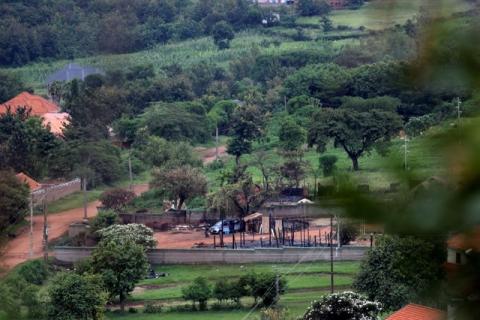Advertisement
Uganda says security forces killed more than 100 in palace assault last year
KAMPALA (Reuters) - Uganda acknowledged on Wednesday that its security forces killed more than 100 people in an assault on a tribal leader's palace last year, revising the death toll upwards by dozens, but denied a rights group's accusation that children were among the dead.
Security forces killed scores of people in November when they stormed the palace of Charles Wesley Mumbere, a tribal leader of the Bakonzo people, who was later accused of leading a secessionist movement.
The palace was torched and Mumbere was detained along with dozens of his guards. He and some of the guards have since been charged with treason, murder, terrorism and other offences, which they deny. He is free on bail.
Officials had previously said 62 people died in the assault. Government spokesman Ofwono Opondo said on Wednesday 103 people had been killed.
However he denied the findings of a new report by Human Rights Watch that the death toll was even higher, at least 155, including 15 children between the ages of 3 and 14.
"Human Rights Watch found evidence, including accounts by confidential sources and medical personnel who witnessed the events, that security officials had misrepresented the number of people killed and eliminated evidence of the children’s deaths," said the report, released earlier on Wednesday by the New York-based watchdog.
The children were last seen in the palace compound, according to their families, the report said.
The accounts of violence worse than previously reported could raise concern among Uganda's Western allies. The United States and Britain help fund Ugandan security forces and see the country as a reliable bulwark against militant Islam in East Africa despite frequent complaints of abuses by state forces.
In a statement responding to the Human Rights Watch report, Opondo denied children were killed.
"There is no evidence to back this falsehood," he said.
The population of the area near the palace, in the foothills of Mt Rwenzori in western Uganda, favors the opposition. Uganda's veteran leader, President Yoweri Museveni, lost to his rival Kizza Besigye there in the last polls in February 2016.
Museveni, 72, has been in power for more than three decades. His critics accuse his government of deliberately stoking violence in the region as retribution for its residents' rejection of the ruling party, a charge the government denies.
A group of Ugandan legislators have petitioned the Hague-based International Criminal Court to investigate the violence. One lawmaker accused the security forces of committing "crimes against humanity."
Opondo ruled out an international investigation since the attack is the subject of an ongoing criminal trial.
(Editing by Katharine Houreld and Peter Graff)



















Add new comment